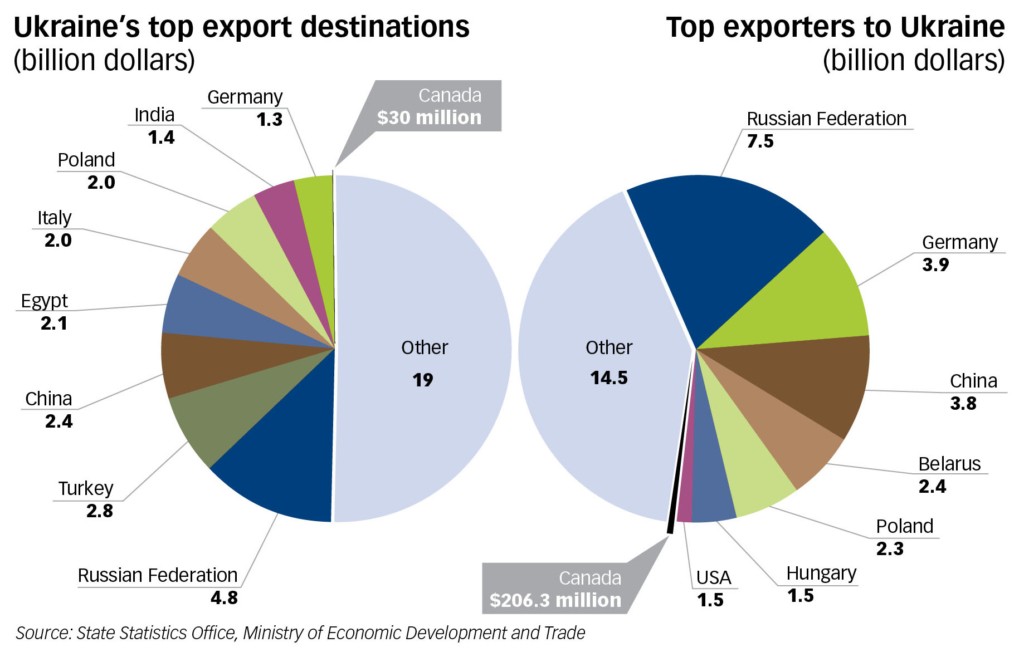More than 270 lawmakers of the Ukrainian parliament voted for ratification of a free trade agreement between Ukraine and Canada on March 14.
Ukraine’s Economic Development and Trade Minister Stepan Kubiv called it the first major trade agreement success since the ratification of a deal with the European Union in January 2016.
Ukraine-Canada trade has lots of room for improvement. Neither country a major trade partner for each other. According to the State Statistics Service of Ukraine, Ukraine exported $28 million worth of goods to Canada and imported $217 million. But the volume is low compared to the overall trade volume of Ukraine, which exported $36 billion worth of goods worldwide in 2016. In fact, Russia remains Ukraine’s single largest trade partner in exports and imports. Distance is a big barrier to Ukraine-Canada trade. So is the disparity in wealth between the two nations – Canada’s gross domestic product was $1.5 trillion in 2016 while Ukraine clocked in at only $82 billion, despite having nearly 10 million more people.

Ukraine-Canada trade relations would seem to have nowhere to go but up. In 2015, Canada exported only $206 million worth of goods to Ukraine and imported even less, only $30 million in goods. But authorities say trade volumes are improving and will get a big boost after the ratification of a bilateral free trade agreement.
Canada’s Prime Minister Justin Trudeau signed the free trade agreement during his official visit to Ukraine on July 11. In February was ratified by the Canadian lower house of parliament and on March 9 by the Canadian Senate. Now the agreement has to be signed by Ukraine’s President Petro Poroshenko and Governor General of Canada David Johnston.
After that Canada and Ukraine will exchange relevant notices and in a month it will enter into force.
Kubiv said Canada’s wealth will help Ukraine find new markets for its heavy machinery and other goods that were oriented on the Russian market. “Canadians will increase the reorientation of Ukrainian enterprises to the Western market and draw Ukrainian exporters away from Russia,” Kubiv said in a video address published on March 14. Each Canadian citizen buys $12,000 a year in imported goods, said the minister.
The increased trade will stimulate jobs, he said, including “approximately 600 job positions a year in IT, industrial and agricultural business,” Kubiv added.
Nataliya Mykolska, Ukraine’s state trade representative, said the Canadian market is very appealing for Ukrainian businesses as every year Canada imports goods on more than $400 billion.
Mykolska said that the Canada-Ukraine free trade agreement includes exemption from customs for 98 percent of Ukrainian goods, such as food supplies, water, juice, vegetable oils, as well as clothes, engines and more.
“The treaty will not only make Canadian and Ukrainian trade faster, cheaper and simpler. It will also give the Ukrainian businesses the new perspectives for international cooperation and foreign investments,” Mykolska added.
Poroshenko praised the agreement and said it initiates a transatlantic bridge of free trade and opportunities.
“It is very important as a response to Russian aggression which threatens not only Ukraine but EU countries, Canada and all the free world,” he added.
Mykolska is confident free trade agreement will help Ukrainian exporters to boost their success in Canada. “Study the agreement, study the new market! Keep calm and focus on UA exports,” said Mykolska in a video address on Facebook.
